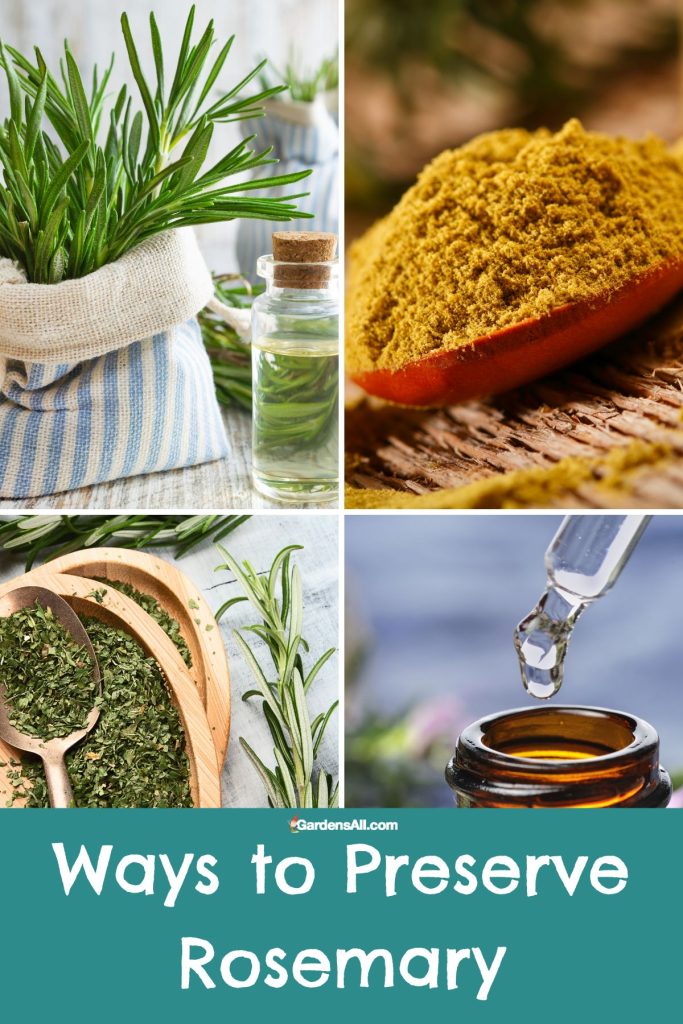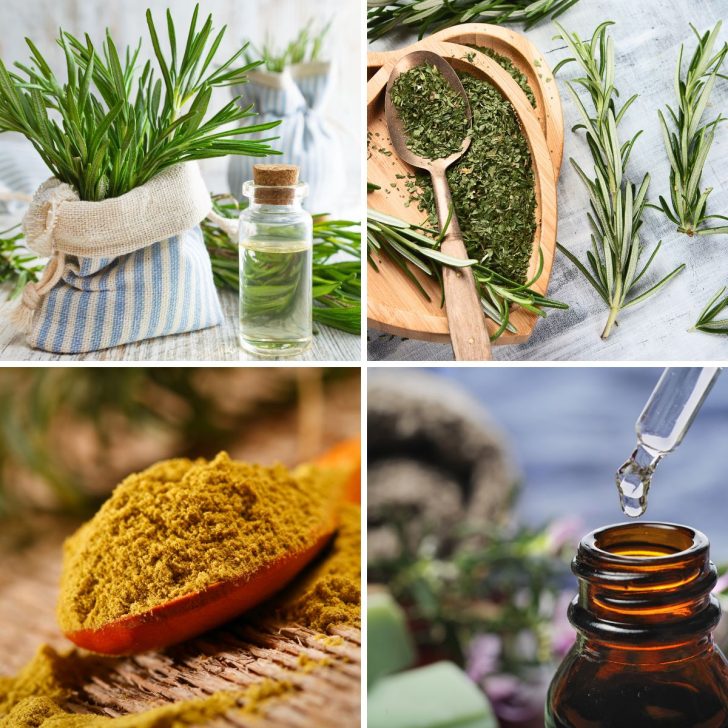There are a number of ways to preserve rosemary. As with other herbs and vegetables, rosemary preservation extends the life and use of the herb and its many wonderful benefits. But how to preserve rosemary depends on how you want to use the herb.
DRIED: Made from Dehydrated Rosemary Leaves
- Air Drying: Tie rosemary sprigs in small bunches and hang them in a dry, warm, and well-ventilated area away from direct sunlight. Once completely dry, store the leaves in an airtight container.
- Oven Drying: Place rosemary sprigs on a baking sheet and dry in an oven at the lowest setting. Check frequently to avoid burning. Store in an airtight container once cooled.
- Dehydrator: Use a food dehydrator following the manufacturer’s instructions for herbs. Store in an airtight container after drying.
See also, our article on drying rosemary.
OIL: Rosemary Infused Oil
- Store the infused oil in a clean, dark glass bottle to protect it from light.
- Keep the bottle in a cool, dark place to prevent rancidity.
- Adding a few drops of Vitamin E oil can act as a natural preservative to extend the shelf life.
See our article on making rosemary oil.
POWDER: From Dried Rosemary Leaves
- After grinding, store the powder in an airtight container.
- Keep the container in a cool, dark place, away from moisture to prevent clumping and mold growth.
You may also enjoy this article on homemade greens powder.
TINCTURE: Rosemary Alcohol Tincture
- Store the tincture in dark glass bottles to protect it from light degradation.
- Keep it in a cool, dark place. Properly stored, a tincture can last several years due to the preserving nature of alcohol.
See also, how to make tincture.
WATER: Rosemary Water or Toner
- Store rosemary water in a clean, airtight bottle, preferably in the refrigerator to extend its freshness.
- Use within a week or two for best results.
- A small amount of natural preservatives like grapefruit seed extract can prolong the rosemary water shelf life.
General Rosemary Preservation Tips
- Always use clean and sterilized containers for storage.
- Label each container with the date of preparation to keep track of freshness.
- Discard any homemade product at the first sign of spoilage, such as an off smell, discoloration, or mold growth.
By following these preservation methods, you can ensure that your homemade rosemary products retain their beneficial properties and remain safe for use over an extended period.
Will Rosemary as an Ingredient, Naturally Preserve the Medium it’s in?
Using rosemary leaves in cosmetics like skin creams and salves can impart some preservative qualities, but it’s important to understand the nuances of this approach. Rosemary, known for its antioxidant and antimicrobial properties, can contribute to the preservation of a product. However, there are several factors to consider:
- Concentration and Form: The preservative effectiveness of rosemary largely depends on its concentration and the form in which it’s used. Simply adding rosemary leaves may not provide sufficient preservation. Rosemary extract, which is more concentrated, is typically used for its preservative properties.
- Spectrum of Protection: While rosemary may offer some antimicrobial and antioxidant benefits, it may not protect against all types of bacteria, yeast, and mold. Synthetic preservatives are often broader in their spectrum of protection.
- Product Formulation: The overall formulation of the cosmetic product plays a crucial role. The pH, the presence of other ingredients, and the type of product (cream, salve, lotion, etc.) all influence the efficacy of natural preservatives like rosemary.
- Stability and Shelf Life: Products with natural preservatives like rosemary might have a shorter shelf life compared to those with synthetic preservatives. It’s important to consider how long the product remains effective and safe to use.
- Quality of Rosemary: The quality and type of rosemary used (organic, non-organic, fresh, dried, etc.) also affect its preservative abilities. The processing of rosemary leaves or extract can alter its effectiveness.
In summary, while rosemary can contribute to the preservation of skin creams and salves, it should be used thoughtfully and in conjunction with other preservation strategies, especially for products intended for a longer shelf life or for those with high water content, where the risk of microbial growth is greater.

I’m LeAura Alderson, a garden, herb and plant enthusiast with a passion for discovering the many edible and medicinal benefits of the plants all around us, including the weeds! I’m a writer, editor and media publisher for our family of websites.
While I was certified in fitness and life coaching, I am NOT a health practitioner. However, I’m a lifelong health enthusiast, with a keen interest in healthy, organic foods and making home remedies and the content we share is from our own experience and usage as well as that extracted from scientific research so that you can explore further on your own.
Always seek the advice and guidance of your health practitioners first and foremost.
As a family we’re steadily expanding our gardening, experimentation and knowledge around all things gardening, edible landscaping, fresh organic foods and self sustainability with farming in our future. I also own and manage iCreateDaily.com, a site all about transformation through creation, and the power of positivity, optimism and mindset.

